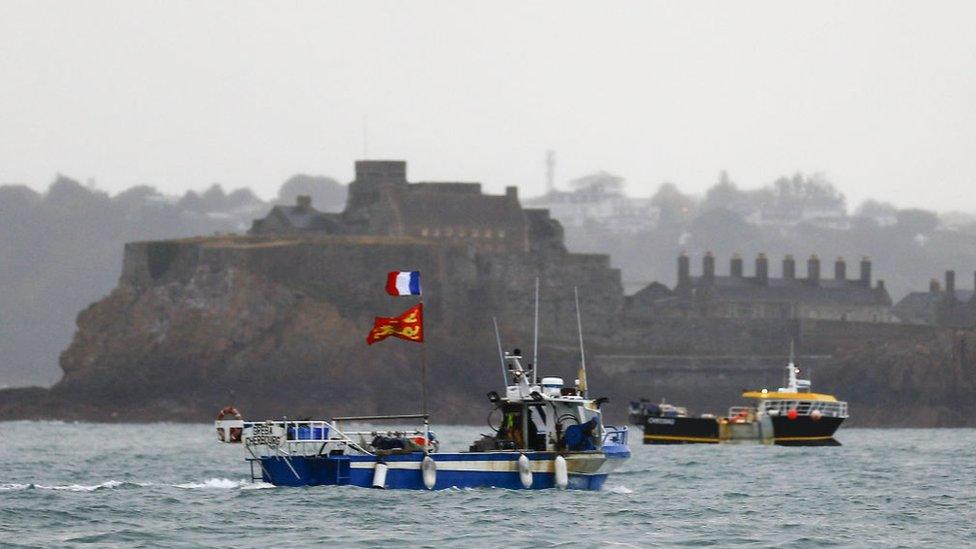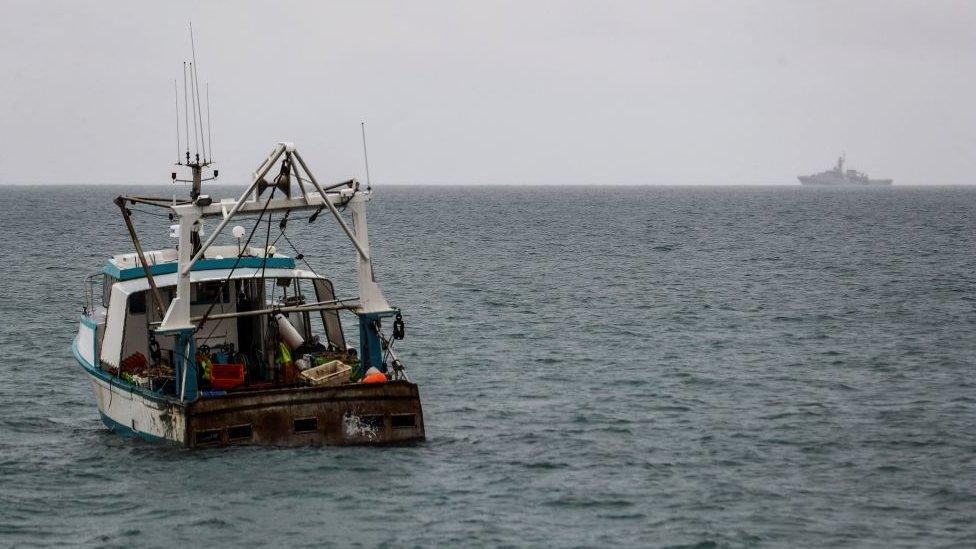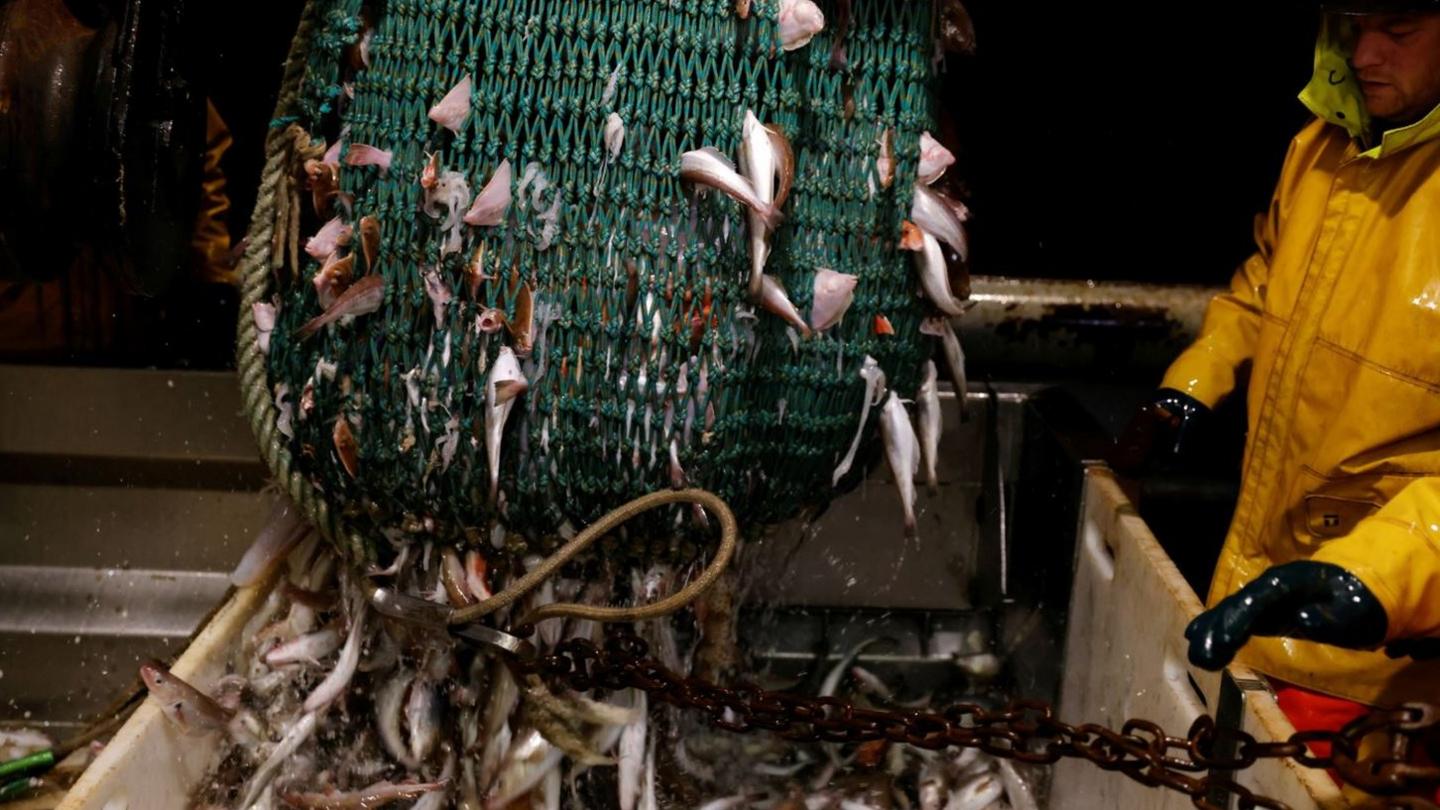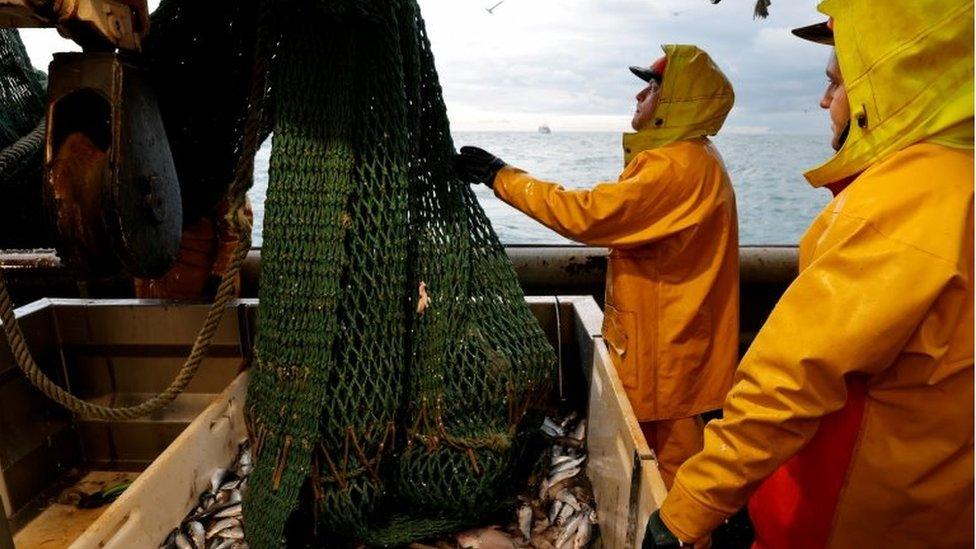French fishermen leave Jersey after post-Brexit rights protest
- Published

A protest over post-Brexit rights by French fishermen at Jersey's main port has ended, following talks that aimed to resolve the row.
About 60 boats protested at St Helier and two Royal Navy ships and two French vessels were sent to the area.
French fishermen say their rights are unfairly restricted by licences issued under the Channel Island's new system.
Jersey's External Relations Minister Ian Gorst said discussions were "positive".
However, a spokesman for fishermen from France's Normandy region suggested that no progress had been made during the talks.
"We're getting deeper into deadlock," Hugo Lehuby told Reuters news agency. "Either this gets resolved, or retaliatory measures are taken."
In Brussels, a European Commission spokeswoman said "additional conditions" attached to the new licences were a breach of the Brexit trade deal.
Meanwhile, No 10 said, in a call with Jersey officials, Prime Minister Boris Johnson had given his "unequivocal support" for the island and confirmed that the two Royal Navy vessels would "remain in place to monitor the situation as a precautionary measure".
HMS Severn, which has previously been used to shadow Russian navy warships off the English coast, can be seen from the port, sitting off about a mile from where the French boats were protesting. HMS Tamar is nearby and both ships are maintaining a presence and did not intervene in the protest.
Shortly after 13:30 BST the two French patrol vessels, police boat Athos and patroller Themis, appeared to be heading south, away from Jersey.

A plan to get noticed
By Jean Mackenzie, BBC Europe correspondent, in Carteret port on the Normandy coast
As the boats pulled out of this harbour at 02:30 on Thursday morning, the fishermen were prepared for this 15-hour stand-off in the cold and rain.
This protest was their plan to get noticed and it worked.
Yes they are angry, but they are also shaken by these unexpected restrictions and worried about their livelihoods. Some fishermen have only been given permission to fish for a handful of days a year.
One fisherman, who catches half his whelks and lobsters along Jersey's shores, told me if he can't get full access to Jersey's waters he will have to sell his boat and change his job.
When they returned to the French coast this evening, drenched and exhausted, they were surprisingly upbeat. Talks with Jersey's government did not go well, they said, but they know they have been heard.
They are now hopeful their government and Brussels will step in to resolve the issue.
They feel their part is done, for now.

Earlier, the maritime prefecture of Manche and mer du Nord told the BBC the vessels were on a public service mission to ensure safety.
France has threatened to cut off electricity to Jersey, the largest Channel Island and a Crown dependency, located 14 miles (22km) off France. Crown dependencies are not part of the UK, but are defended and represented internationally by the UK government.
The boats were protesting against new fishing rules - introduced last week by the Jersey government under the UK-EU Trade and Co-operation Agreement (TCA) - which require French boats to show they have a history of fishing in Jersey's waters. But it has been claimed additional requirements were added without notice.
French authorities say "new technical measures" had not been communicated to the EU, rendering them "null and void".
"We agreed that all sides remain committed to engaging with our partners in the EU and France to resolve the concerns arising from the issuing of fishing licenses under the Trade and Co-operation Agreement, which led to today's protest," Jersey's Senator Gorst said.

Earlier, Jersey fisherman Loic Farnham said of his French counterparts: "They are professional fishermen, the same as we all are, we'd like to keep it all amicable so we can have access to the markets and they can carry on earning a living in our waters."
The maritime prefecture of Manche and mer du Nord told the BBC the two French vessels were not on military missions.
It said the boats' roles were to stay in French waters and to be near the fisherman in order to ensure safety.
An Elysée source said France was monitoring the situation "very closely", adding that it is "currently calm and we hope that this will remain the case".
"We want to be able to return to negotiations, that we can obtain the fishing licenses provided for in the agreement."

What is the Jersey fishing row about?

HMS Tamar is one of two Royal Navy ships that are off the coast of Jersey
French fishermen have complained about being prevented from operating in British waters because of difficulties in obtaining licences.
Under an agreement with the EU, French boat operators must show a history of fishing in the area to receive a licence for Jersey's waters. But it has been claimed additional requirements were added without notice.
Jersey has the sole power to issue the licences, and as of last week all fishing boats were required to have a licence to operate there.
On Friday, the Jersey government granted 41 permits to French fishing vessels that are equipped with technology that allows them to be located.
But the French government claimed the list of approved ships came with further demands that "were not arranged or discussed, and which we were not notified about".
Chris Le Masurier, who runs Jersey Oyster and Normandy Trader Freight, said the French fisherman were rightly upset by the situation.
He said: "I see it as very much an insult to them and they are extremely upset. The criteria that they were given was to prove they have fished in Jersey waters for 10 days. Nothing about what species were caught, nothing about if you've fished for 20 days or 30 days [and having to] prove that."
But Don Thompson, from the Jersey Fisherman's Association, said affected French crews have "had since 1 January" to comply with the new rules and "perhaps some of the boats that perhaps didn't qualify are a little bit put-out".

The threat to cut off Jersey's electricity supply - 95% of which is delivered by three underwater cables from France - was made by French Maritime Minister Annick Girardin on Tuesday.
HMS Severn and HMS Tamar, which are based in Portsmouth, are each crewed by 45 sailors and up to 50 Royal Marines.
The ships are routinely used for fisheries protection - with sailors able to board other boats for spot checks.
Additional reporting by BBC Jersey's political reporter Freddie Miller.
Update: This story has been amended to clarify the specifications of Royal Navy vessels HMS Severn and HMS Tamar.

"I READ MUSIC SCORES AS IF THEY WERE SUBTITLES": What it's like to be a deaf musician
FRESH STARTS: Stacey Dooley chats to people who have embarked on new beginnings

- Published5 May 2021

- Published4 May 2021
